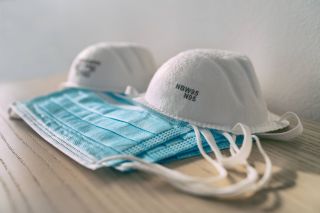A new research has revealed that homemade masks and some medical masks could withstand simple disinfection without significantly reducing their effectiveness.
The study also revealed that disinfecting homemade masks by heating them may not significantly reduce their effectiveness and that some medical masks can undergo this process and still be effective.
Since the outbreak of COVID-19 in Wuhan, China in Mid-December, 2019, the use of face mask has been introduced as one of the measures to help curb the spread of the virus.
According to the World Health Organisation (WHO), the viruses that cause COVID-19 and Severe Acute Respiratory Syndrome coronavirus 2 (SARS-CoV-2), are primarily transmitted by coughing and sneezing, adding that droplets of saliva and discharge from the nose can carry the virus.
“It can be directly passed on if, for example, someone with the infection coughs or sneezes, and another person in close proximity breathes in the resulting droplets. The virus can also survive on surfaces that the droplets land on.
“Transmission can occur if a person comes into contact with the droplets on a surface and the virus gains access to the person’s body if, for example, the person touches their face” after touching the infected surface.
WHO also stated that there is also evidence that some people with the infection experience few, if any, symptoms and may still be able to pass on the virus.
The Centres for Disease Control and Prevention (CDC) therefore recommended wearing cloth face coverings in situations when it is difficult or impossible to maintain a distance of six feet between people.
They urged people to make their own face masks and reserve surgical masks and N-95 respirators for healthcare workers. The CDC has produced a guide on how to make a face mask at home.
The Nigeria Centre for Disease Control (NCDC) and the Presidential Task Force (PTF) on COVID-19 have also recommended the use of face mask as a means of preventing the spread of the coronavirus.
In light of this advice, the researchers behind the present study set out to investigate ways of disinfecting masks safely killing any SARS-CoV-2 without reducing the effectiveness of the masks over time.
They studied means of disinfecting homemade masks and those for healthcare workers, as reusing masks may help ease pressure on dwindling stocks.
The study authors cite previous research demonstrating that heating masks to 70oC (158oF) is effective at killing the SARS-CoV-2 virus.
While other disinfection techniques have also proven effective, heating can be done by anyone with access to a stove.
Prices of face masks at a time in Nigeria became too high for ordinary citizens to buy them thereby making people to resort to making their own masks, with some producing for sale.
The research, published in the journal of the International Society for Respiratory Protection, may be valuable for reducing the pressure on stocks of medical masks during the coronavirus disease 19 (COVID-19) pandemic.
To test how effective masks are after disinfection by heat exposure, the authors applied different masks to the heads of mannequins designed to simulate the drawing of breath.
Because it had already been established that heating to 158oF could kill SARS-CoV-2, the researchers did not need to work with the virus. Instead, they used soot from a kerosene lamp, the particles of which are roughly the same size as SARS-CoV-2 particles.
The authors then tested two disposable N-95 respirator masks, one disposable surgical mask, and three homemade masks, from a cotton dress, a cotton sweater, and polyester cloth.
The authors explored the effectiveness of homemade nose clips applied to the mask. They found that, when applied to disposable masks with a regular fit, the nose clips significantly increased filtration efficiency: to 98% for the N-95 mask and up to 88% for the surgical masks.
Nonetheless, the authors, from Columbia University’s Lamont-Doherty Earth Observatory, in Palisades, NY noted that, “Everything we know so far suggests that wearing almost any kind of mask in public is better than nothing; that a tight fit is best, and that, with certain limits, many types of masks can be reused outside of medical settings.”




